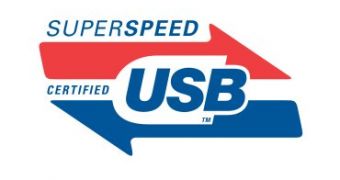The USB Implementers forum has already certified quite a few SuperSpeed-ready devices, all things considered, but it looks like it finally got around to four-port host controllers as well, one developed by Texas Instruments to be exact.
By now, users will well know of the SuperSpeed USB 3.0 connectivity standard and how it has gained popularity despite the odds.
Essentially, it is the latest incarnation of the Universal Serial Bus technology and, compared to USB 2.0, works at a speeds that is 10 times faster.
In numbers, this equates to a theoretical maximum data rate of 5 Gbps, hence how so many flash drives and external HDDs or SSDs have adopted it over the past year.
Now, USB-IF has certified its first four-port USB 3.0 hub controller called TUSB7340, as well as the TUSB7320 SuperSpeed USB two-port host controller.
“The SuperSpeed USB ecosystem has seen enormous expansion since the second certified host controller was announced four months ago, and this latest certification increases the choices available to manufacturers looking to develop new and innovative products,” said Jeff Ravencraft, President & COO, USB-IF.
“Consumers trust USB because of its interoperability and ease of use, and the certification and logo licensing programs create an easy way to identify products that will interoperate straight out-of-the-box. With the groundswell of certified products helping to create a competitive ecosystem, SuperSpeed USB remains the most cost-effective and trusted high-performance interconnect solution worldwide.”
Both of these products were developed by Texas Instruments and should have vast interoperability, in addition to power efficiency.
“Texas Instruments understands the importance of standard compliance for creating a strong and diverse market,” said Eric L. Williams, General Manager, Interface & Clock Products Business Unit, Texas Instruments.
“This certification of the TUSB7340 and TUSB7320 host controllers demonstrates our commitment to providing innovative solutions that are fully interoperable and compliant to the specification.”

 14 DAY TRIAL //
14 DAY TRIAL //